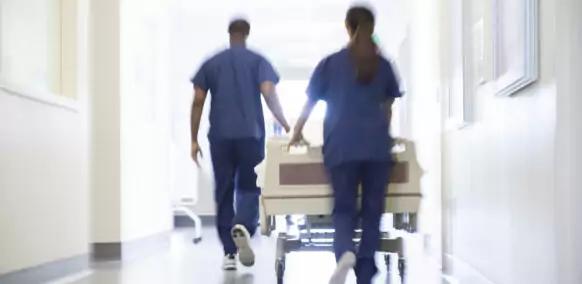Do Not Resuscitate Decisions
The current pandemic is placing huge demands on the NHS and as a result ‘Do Not Attempt Resuscitation Orders’, or DNRs, have been added to medical notes inappropriately. If you believe that a DNR has been added to yours or a loved ones medical notes in error you may be able to make a medical negligence claim.

Investigating the inappropriate use of DNR Orders during the Covid-19 pandemic
Been Let Down are currently investigating claims on behalf of patients who believe a ‘Do Not Attempt Resuscitation Order’, or DNR, has been added to theirs or their loved one’s medical notes inappropriately.
As the current pandemic is placing unprecedented demands on the NHS, we have put together this brief guide for patients and families to understand their legal rights associated with Do Not Resuscitate (DNR) decisions which have increased in number significantly during the pandemic.
What is a DNR?
A DNR, or Do Not Resuscitate Order, is a medical order given by a doctor that instructs other health care professionals to not attempt to resuscitate via CPR (cardiopulmonary resuscitation) if a patient’s heart stops or they stop breathing.
A DNR is also commonly known as DNAR and DNACPR (do not attempt resuscitation/ do not attempt CPR).
How and when can DNR orders be used?
DNR decisions can be made in advance as part of a long-term care plan if a patient has a known illness or can be discussed with a patient or their family in the event of a deterioration in their condition following a sudden illness.
Decisions to add a DNR to a patient’s records should always include the patient and their family as part of an individual assessment. They should consider not just how the patient is in the moment, but how they were two weeks before they became ill and any underlying health conditions they have.
These decisions are not usually made lightly and they should be undertaken with the utmost care and compassion. Only when the patient and their family are properly informed and consulted can a proper decision be reached. A patient’s family should be consulted if the patient is unable to advocate for themselves.
Have DNR orders been added more frequently to medical records during the pandemic?
Evidence provided by the University of Sheffield suggests that some patients admitted to hospital during the Covid-19 pandemic were asked to agree to a DNR order on admission to A&E. This included instances when a patient did not require intensive care treatment, or sometimes when they had been admitted with entirely unrelated conditions.
The decision-making tool used to assess whether patients should be given a DNR became more acute during the pandemic, possibly due to the fear that the NHS would become overwhelmed.
The University of Sheffield analysed data relating to almost 14,000 patients admitted to hospital with suspected Covid-19 during the first wave of the pandemic. Of these patients, 31% had a DNR order added to their medical records either before or within a day of their admission.
Patients with a DNR order were more likely to die and were less likely to receive support for their vital organs, like a ventilator or kidney dialysis. These lifesaving treatments should still be offered, even if a patient has a DNR.
Just 1.3% of patients who had a DNR before or within a day of their admission to hospital received support from a mechanical ventilator to help them breathe. This treatment is not CPR and should have been provided if required. Shockingly, only 45.6% of patients who had a DNR at the time of their admission or within a day were in fact suffering with Covid-19.
Another study in the West Midlands found that the rate of new DNR orders more than doubled during the pandemic. This study also found that patients with a DNR were younger and less likely to be suffering from other health conditions like cancer or heart failure.
Does a DNR order affect other treatment decisions?
DNR orders should not affect other treatments provided. They should only mean that a patient is not given extraordinary measures if their heart stops or they stop breathing, i.e., by way of mouth-to-mouth or using a defibrillator to shock the heart.
The patient should still receive care to extend and attempt to save their life, including medication and ventilation, but we have seen that this has not always been the case.During the early days of the pandemic, there were concerns that the NHS would become overwhelmed and not have enough capacity to provide treatment to everyone who needed it. Sadly, this may have influenced the decision-making process.
Due to this, some healthcare providers took the decision to add a Do Not Attempt Resuscitation Order to patients who were fit and well in the weeks before their admission and could have had a good chance of surviving.
The Care Quality Commission who regulate hospitals and other health care providers have recently published a report acknowledging these instances of inappropriate DNRs. For example, because they were not discussed with the patient or their families, or because they were not part of an individual assessment.
Do I need to give my consent to a DNR order?
Unfortunately, it is not necessary for a patient or their family to give their consent to a DNR. However, they should be involved in the decision-making process and ensure that the doctor has all of the relevant facts before making a decision. If a doctor believes that CPR would be unsuccessful, they may decide on adding a DNR order without consent.
How long is a DNR order valid for?
A DNR order can be valid for a short period, for example to cover a particular admission to hospital, or may be written with no end date. When a DNR is made, the patient or their family should be told when it should be reviewed and this is usually recorded on the document.
It is recommended that a DNR is reviewed each time the patient’s situation changes. For example, if they are well enough to be discharged from hospital it may be appropriate to remove it.
What if the patient has no capacity?
If you as a patient are not well enough to make a decision regarding CPR, your family should be consulted. CPR not only includes shocking the heart and mouth-to-mouth resuscitation but also can include providing lifesaving medications.
What if there is a disagreement?
If you disagree, you can ask for a second opinion and, if necessary, you can go to court to fight for your right to CPR. You must be able to find a doctor who would be willing to provide CPR to have a chance of a successful case.
How can I claim for an inappropriately applied DNR decision?
If you believe a Do Not Attempt Resuscitation or DNR order has been added to your loved one’s medical notes in error and they have suffered an injury or died as a result, please get in touch with Been Let Down’s specialist team today. Our legal team will listen to you to understand what happened and will advise you on the next steps.
If you are making a claim on behalf of a patient who has passed away, the person bringing the claim will need to be named in their will as an executor or if there is no will, their personal representative.
Can I claim compensation for an inappropriately applied DNR decision?
If you believe that a Do Not Resuscitate Order has been added to your medical notes in error and this has caused an injury, you could be entitled to claim compensation.
You and your family could be entitled to claim:
- Financial compensation for pain and suffering from any injuries suffered as a result of the DNR
- Compensation for financial losses caused by the injury i.e. loss of earnings or pension
- Compensation for loss of services i.e. DIY or childcare
- Statutory bereavement award in the event of the death of your spouse, co-habiting partner of at least two years, or child under the age of 18
Here to support you and your loved ones
If you have been affected by an inappropriately applied DNR decision that has resulted in an injury or even death, please get in touch today to find out how we can help with your case.
Our expert medical negligence solicitors can discuss funding options with you further, but most of our cases are run on a ‘No Win No Fee’ basis. This is a Conditional Fee Agreement, or CFA.
Here at Been Let Down, we have highly skilled medical negligence solicitors who will be able to review your concerns and provide you with the options available to you.
Contact us today
Get in touch with one of our legal experts in confidence today by calling 0800 234 3234 or you can contact us online.
- Accident & Emergency (A&E) Compensation Claims
- Brain Injury
- Cancer Misdiagnosis Claims
- Bowel Cancer
- Cerebral Palsy Compensation Claims
- GP Negligence Compensation Claims
- Gynaecological Medical Negligence
- Medical Misdiagnosis Compensation Claims
- Medication Errors and Negligence Compensation Claims
- NHS Medical Negligence Claims
- Ophthalmic Claims
- Orthopaedic Injury
- Surgical Errors Compensation Claims
